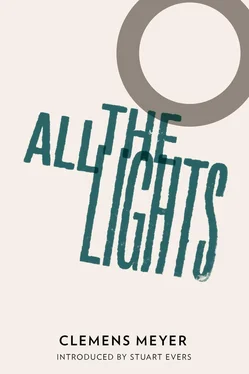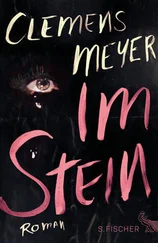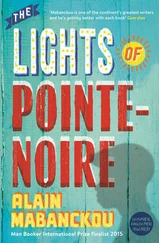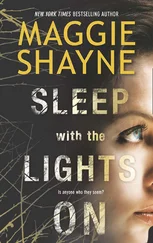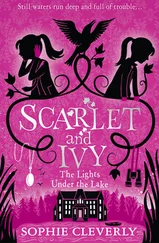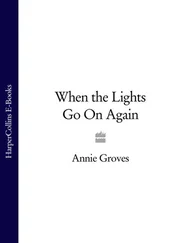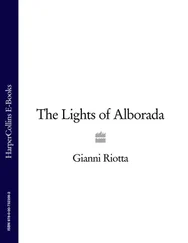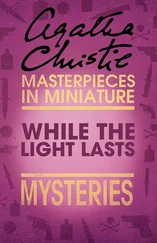‘No.’ She pushed the exercise book higher, until it touched the tip of her nose, and spoke through the paper. ‘My parents, Mr Krein …’
The dachshund was lying on the floor at his feet. He bent down and balanced it on its short matchstick legs. A stabbing pain in his head. He took a deep breath as he leaned back. ‘Is there a law against going for an ice cream with Juli? Is there a law against going swimming with Juli? Is there a law against …?’ He started shouting but there was no one there, only the dachshund at his feet. He had shouted when the man from the school inspection board had sat opposite him in the secretary’s office. ‘Investigations, you go ahead and do your investigations!’
‘At the moment all it’s about is unjustified favouritism and support for a pupil …’
He stood in front of the mirror in his bathroom, pressing both hands to the glass. How did that little poem go again, the one she’d recited for him when they were sitting in the sun? That May had been so warm … two ice cream sundaes. He saw her lips moving, her hands gesticulating above her ice cream while she recited the poem. She closed her eyes when she got stuck, the small crease from the top of her nose to her forehead. Was it Goethe? He knew nothing about literature. Yes, it was Goethe. Or maybe Schiller or some other poet? He’d been so happy, next to her at the table, and her hands above the ice cream sundaes, and the poem, but the only thing he was good at remembering was numbers. ‘My heart it beat …’
He took his hands off the mirror, saw the moist prints they left behind fading. ‘… the evening bowed t’ward the earth …’ The blackboard … He shuddered, didn’t want that in his head, the blackboard, the big white letters; he went to the door. He walked back down the dark hallway to the kitchen.
He stood on the tiles, feeling for the light switch. He looked over at the window; it must be evening by now. He turned on the light and took a couple of steps, then his legs fell away beneath him, he raised both arms, nothing to hold onto, then he was on the floor, and his head smashed against the wall. He lay on his back like that for a while, then slowly turned onto his side. The trampled cutlet in aspic lay next to him.
He went into the classroom. He went to the blackboard, not looking around, heard the children talking softly, the rustle of paper; he opened the two flaps of the blackboard. ‘Fatty loves Juli,’ it said in wobbly white capital letters, a heart drawn beneath it in red chalk. He placed one hand on either side of the heart and stood like that for a while, supporting himself against the blackboard, all quiet behind him now. He stood upright, saw the moist prints left behind by his hands — he could make out each separate finger — then he turned around slowly. Juli’s seat was empty. He went to the door.
He walked down the hallway. He was sweating, and the sweat ran into his eyes.
It started when his dog suddenly started to limp, and then came to a halt outright. It was a pretty big dog, a Rottweiler-Doberman mix, a hundred pounds, and in the six years that Rolf had been living with him the dog had never limped and had never just stopped walking either. He’d been with him in the mountains and by the sea, took long walks with him every day, and the dog’s long ears moved up and down when he ran.
‘Piet,’ said Rolf, ‘what’s up with you, boy, you’re not that old yet.’ Piet stood in the middle of the pavement, his back legs far apart; he stood there as if straddling something, looking at him with his dark eyes. He pulled on the leash but the dog didn’t move. He squatted down in front of him and stroked his head. ‘What’s up, boy, what’s the matter, shall we just have a bit of a rest? You’ll be all right in a minute, won’t you Piet?’
He’d called his dog Piet because of Pete Sampras, the tennis player, but he’d written the name with an ‘ie’ on the dog licence to make it a bit more mysterious. Rolf wasn’t really a tennis fan at all, but he’d seen Pete Sampras a couple of times on TV in some tournament or other, and the elegance with which he outplayed his opponents had impressed him. And now Piet was standing there and wouldn’t budge an inch and hung his head. They were still a mile or so away from home and he wouldn’t be able to carry him. He’d lifted him up for fun a couple of times and lugged him around the apartment, but the dog had wriggled around and his back had started aching after only a few yards.
He gave another tug on the leash and said, ‘Come on, let’s go home, there’ll be a treat for you when we get home.’ And the dog took a few steps; his back legs buckled strangely inwards and he limped a little, but he was walking. They walked home very slowly, and sometimes Piet stopped again, and then he stroked him and waited until he could carry on. They lived on the first floor, up half a flight of stairs, and the dog had problems getting up the couple of steps to the apartment door; that morning when they came back from their first walk of the day there had been no stopping him; he knew his food was inside.
He opened the front door and Piet went straight to his corner and lay down. ‘Damn it,’ he said, ‘what on earth’s up with you boy, you’re not gonna …’ He sat down in the armchair right in front of the dog’s blanket. He often sat here and read the newspaper or watched TV, his dog right next to him. All he had to do was reach out his hand to touch him.
‘You’re not gonna give up on me,’ he said, putting his hand on Piet’s head and stroking him behind the ears. ‘You can’t give up on me.’ He sat in the chair and looked down at Piet, who lay quite still, only his back rising and falling slightly. It was very quiet in the flat, with only the fridge humming in the kitchen, and he sat there and took his hand off Piet’s head, folded his hands and rubbed them together over and over. They had been living together for six years, Rolf and Piet, and he couldn’t imagine sitting alone in his flat again, like eight years ago when his wife had gone, just the humming of the fridge in the silence. He rubbed his hands together, then jumped up and ran to the kitchen. He fetched the big pack of dog biscuits out of the cupboard and took out a handful. Usually the sound of the cupboard doors banging was enough to make Piet come running, but he didn’t come even when he shook the pack. He put it back in the cupboard and stood in the kitchen with the handful of dog biscuits, waiting. The fridge hummed next to him, and because he couldn’t stand it any more he shouted, ‘Piet, where are you boy, I’ve got a treat for you!’ And then Rolf heard him. He heard the tip-tap of his steps in the hall, and then he saw Piet’s head in the doorway, ‘Come on, come and get it,’ and the dog ran towards him, jumped up at him, and he said, ‘Down boy, sit,’ and Piet sat down in front of him and stretched out a paw towards him, although he hadn’t said ‘Shake’, and then he gave him the dog biscuits and Piet crunched them up and ate them, and he said, ‘There you are boy, you’re eating them up nicely, you’re not feeling so bad are you, you were just tired before.’ He watched as Piet ate the dog biscuits one after another, and he was happy.
‘Hip dysplasia,’ said the veterinarian and pointed to the X-rays, but Rolf couldn’t make out anything much on them. ‘Advanced stage,’ said the vet, ‘we’d have to operate. There are various options, gold implants and so on, but with artificial joints and the latest methods he could live a long life.’
‘He was running around just two days ago.’ Piet lay next to him, and Rolf kept his hand on his head. Piet was really scared of the vet, he moaned and yelped in the waiting room and didn’t want to come through to the surgery, although he only had his injections there once a year. He could smell the other animals’ fear, and maybe death too.
Читать дальше
